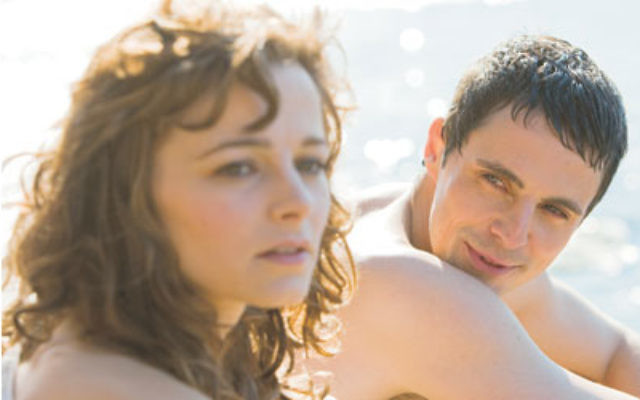Cooking up a storm of burning emotions
FILMMAKER Jonathan Teplitzky’s powerful new movie Burning Man comes from the depths of his own experience and takes the viewer on a journey that is both confronting and profound.
Born to Jewish parents, Teplizky grew up in Sydney and went to Middlesex University’s film and television school in London. After a decade producing commercials and music videos overseas, he returned to Australia and hit the ground running with his first feature film, Better Than Sex (2000), which received eight AFI nominations. Gettin’ Square followed in 2003, winning similar acclaim.
Now his third feature film, Burning Man, which he has written and directed, has been released by Paramount Pictures and is moulded in a very different style.
It plunges without preamble into the dysfunctional world of Tom, played by British actor Matthew Goode (Match Point, A Single Man). He’s a talented, workaholic Bondi chef whose life is unravelling, erupting into violent rages almost at whim. And while Tom is wryly funny and attractive to women who tolerate his erratic behaviour, he finds sexual satisfaction or close friendships with them impossible.
The reason for this isn’t immediately clear, as Teplitzky plays havoc with conventional narrative, and zooms from present to past and back again as if taunting the viewer to make sense of his story.
But there are hints, the most disturbing and dramatic being a hallucinatory car crash early in the film, which haunts the story and becomes its most powerful metaphor.
Burning Man is about the destructive, almost centrifugal force of powerful emotions, and Teplitzky’s great success is to invent a cinematic structure that depicts this state while creating utterly believable characters.
Tom is an English chef with the volatility of a Gordon Ramsay and wouldn’t look out of place in a MasterChef kitchen. Yet this conversancy with the restaurant trade and modern Australian cuisine brings flavour, colour and urgency to Teplitzky’s tale, and comes from the filmmaker’s own experience.
With a Sephardic background, Teplitzky’s mother, Gretta Anna Schneideman, who was born in New Zealand, was a doyen of the Australian cookery scene, and opened one of Sydney’s first French restaurants in the 1950s.
“In those days, Mum had a great interest in cooking. She went back and forth to France, where she knocked on doors and worked for six weeks at a time in the kitchens of half-a-dozen three-star Michelin restaurants,” recalled Teplitzky.
“She had quite a lot of front, and chefs such as Roger Vergé (chef of the famed Riviera restaurant Le Moulin de Mougins) became her friends.”
Gretta Anna ran her own cooking school for 30 years and published two cookbooks, which were reprinted many times. Up to 10,000 people learnt the art of cooking through attending her classes, not the least being Teplitzky’s brother, who became a chef himself.
Because of the centrality of cooking in his family, Teplitzky gravitated to working in kitchens as a student, and when his brother Mark opened his first restaurant in Sydney, Teplitzky worked for him for a year.
“It’s a world I love, but it’s also a very brutal world,” he said. “When I first began writing a script about a chef and restaurants and what have you, the story never really found its feet. Then one day I suddenly realised that the two things (life and restaurants) go together perfectly.”
The turmoil at the heart of Burning Man is based on Teplitzky’s own reaction to the loss through cancer of his life partner, costume designer Amanda Lovejoy, whose on-screen character, Sarah, is played superbly by Bojana Novakovic (Marking Time, Edge of Darkness).
“In the year after that event, I felt as if I’d been given a ‘get out of jail free’ card. Once you get used to the tragedy and the sadness of it, no rules seem to apply anymore. There is a certain exhilaration associated with that feeling. The shackles are broken,” said Teplitzky.
“You’re sort of free from all the things that up to that point have constrained you. In a way, this was the starting point of the film. It just struck me that this was an incredibly interesting energy to follow in a character.”
In writing Burning Man, Teplitzky tried to mirror his own experience as closely as possible, and hopes audiences can identify with Tom and see themselves reflected in the story in some way.
“I have been interested in playing with structure for a long time, and when I came to write it, after about six years, it all fitted so neatly together and reflected the kaleidoscope that is Tom’s world. I had a lot of notes,
but I really just started and let it organically unfold of its own accord,” he said.
“Films are often so tied to the plot, they don’t give viewers enough space to take from it what they want or need. I wanted some kind of visual thing that told us something about the incendiary nature of Tom’s world, and what he was going through. I wanted to fill the film with images that are life giving – food and sex and fire and water.
“I’m very conscious that many of the images I use come from religion and art history. The iconography is very similar, without any of it being specific. I hope there’s room in the film for each individual to adopt, embrace, and engage with what it is that they see on the screen.”
Burning Man is currently screening.
REPORT by Jan Epstein
PHOTO of Bojana Novakovic and Matthew Goode in Burning Man.


comments